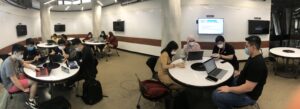Week 6: The Bus Tour (Metaphor)

Image 1: My classroom
The classroom is the bus. As mentioned in my previous post on my ideal learning space, the classroom needs to be comfortable, flexible and individualised. The first thing any participant of a bus tour judges is the conditions of the bus. The seats should be comfortable. A participant should be able to adjust his or hers. He or she should be able to customise his or her little space (e.g. hanging snacks on the hook on the seat, turning the air-conditioner outlet) Moreover, the classroom, like the bus, is not just a vehicle (for learning). It is a protective space for the learners. The screens are windows to the world outside. They broadcast images, videos and text that are related to the course content.
The curriculum is the route. All bus tours and lessons have itineraries. The former would include landmarks (e.g. historical sites, places of interest) while a lesson would have teaching or learning objectives. It’s difficult for someone to claim that he or she has visited London but not seen the Big Ben. Similarly, an undergrad needs to have learnt how to formulate a thesis statement to say that he or she has taken an academic writing course. Pacing is important. Rushing from site to site is neither educational nor enjoyable, but some shady agencies will always try to maximise their profits. Likewise, a lesson needs to be paced well for students to engage with the course content.
The teacher is the tour guide. Biesta (2012) argued that the constructivist view has relegated the teacher to the role of a facilitator as emphasis is placed on the student. On a bus tour, the focus is on neither. It is the journey that matters the most. Everything is in dynamic relationships with everything else, contributing as well as being shaped, to create a meaningful experience. As much as the student is discovering the course materials, he or she is also (ideally) applying it to his or her reality. In the same vein, the teacher isn’t there to just stand at the front of the class and share snippets of information, facilitate activities or answer queries. The teacher contextualises, and at times decontextualises, the content and experience. In both situations (the bus tour and the lesson), a joke or two is always appreciated.
The students are (clearly) the participants. The older ones (adults) are almost always there by choice. On the other hand, some of the youths are there at the insistence of their parents (see image 2). Some participants are happy to sit quietly in their seats, and absorb everything they see and hear. Others are more pro-active, contributing when they can and asking questions. Of course, there may be the disinterested individual texting away on a mobile while trying to be the first human to successfully disintegrate gum by chewing. Regardless, the teacher works to ensure that everyone leaves with something and that even the least motivated individual would have learnt something by the end of the journey.

The images used in this meme was taken from Mortal Kombat. 1995. [film] Paul Anderson.
The key difference between the bus tour and the real lesson is the teacher is not allowed to receive tips.
References:
Biesta, G. J. (2016). Giving Teaching Back to Education: Responding to the Disappearance of the Teacher. Pedagogía Y Saberes, (44), 119-129.




Love this analogy. Remember though there are lots of different bus operators that will insist their routes and guides are the best. Some will show you buildings financed by slavery while others will show statues of great military leaders. ‘Buses’ are places where people are socialised into society as they learn its norms and values.